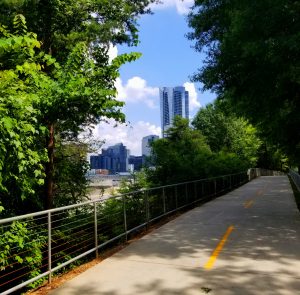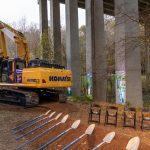The Modernization of Atlanta’s Tree Protection Ordinance Begins: Phase 1
 The City of Atlanta’s press release on April 13, 2023, welcomed the beginning of the updated New Tree Protection Ordinance or TPO. Phase 1 modernizes the city’s tree codes to align with Atlanta’s Power to Change sustainability initiative. The December 2022 overhaul to the ordinance was the first in over two decades. Atlanta Mayor Andre Dickens stated, “As climate change continues to disproportionately impact urban environments, it is imperative that our city’s code is designed to protect and grow our tree canopy—our most powerful nature-based tool for climate resilience. The standards set in the updates to the Tree Protection Ordinance—coupled with initiatives like doubling Downtown’s tree canopy with 8,000 trees over five years and others—will further help reduce energy costs, improve our air and stormwater management and raise the overall quality of life for residents.”
The City of Atlanta’s press release on April 13, 2023, welcomed the beginning of the updated New Tree Protection Ordinance or TPO. Phase 1 modernizes the city’s tree codes to align with Atlanta’s Power to Change sustainability initiative. The December 2022 overhaul to the ordinance was the first in over two decades. Atlanta Mayor Andre Dickens stated, “As climate change continues to disproportionately impact urban environments, it is imperative that our city’s code is designed to protect and grow our tree canopy—our most powerful nature-based tool for climate resilience. The standards set in the updates to the Tree Protection Ordinance—coupled with initiatives like doubling Downtown’s tree canopy with 8,000 trees over five years and others—will further help reduce energy costs, improve our air and stormwater management and raise the overall quality of life for residents.”
The changes, being done in phases, will give the City Arborist more resources for enforcement and tree canopy enhancement. But how will these updates affect the community? Changes include modifying tree protection and enforcement, tree planting, and administration roles. New rules for planting trees in parking lots and along streets surrounding new residential and commercial developments, developers must now plant or preserve at least one tree for every eight parking spots and no parking space can be more than 45 feet from a tree, new residential or commercial developments are now required to have trees planted every 40 feet along all surrounding streets are just a few of the revisions. Other additions include spacing requirements and soil volume to help with the growth of saplings and favoring native tree species. A draft is being worked on and will be ready by fall or winter of this year for Phase 2. Phase 2 will embrace tree preservation and an income-sensitive tree replacement program.
Livable Buckhead has been dedicated to the progression of health and wellness through greenspaces since its formation in 2011 by Denise Starling. Buckhead’s Strategic Sustainability Action Plan created in 2018 focused on an actionable sustainability plan for the communities. One of Buckhead’s goals within its Health and Wellness area is to influence community design and future development to enhance healthy living. Greenspaces goals within the plan incorporate the collaboration within the community to develop parks that are inclusive and accessible. Seeking opportunities to activate greenspaces by embodying programming that narrows the outcome gaps between the advantaged and disadvantaged populations. The TPO changes will allow a larger scope and sequence of action within the Action Plan.
The TPO updates will help reduce energy usage, remove air pollutants, filter storm water, and cool the city by releasing water vapor. NASA’s ATLANTA project formed in 1996 reporting temperatures to be 10 degrees hotter in what they call the “urban heat island”. The group found large urban areas are warmed by their own urban heat islands because of the removal of trees. The TPO modifications address these issues and are steps toward making Atlanta a top-tier model for sustainable cities creating positive global impact.
Teresa Perkins is a climate change and sustainability journalist, who is creating research-based climate change content pertaining to sustainable energy at local, national, and global level for publication and distribution. She partners with non-profit organizations for innovative ideas and sustainability projects and connects global UN Climate Change reports to local initiatives.





